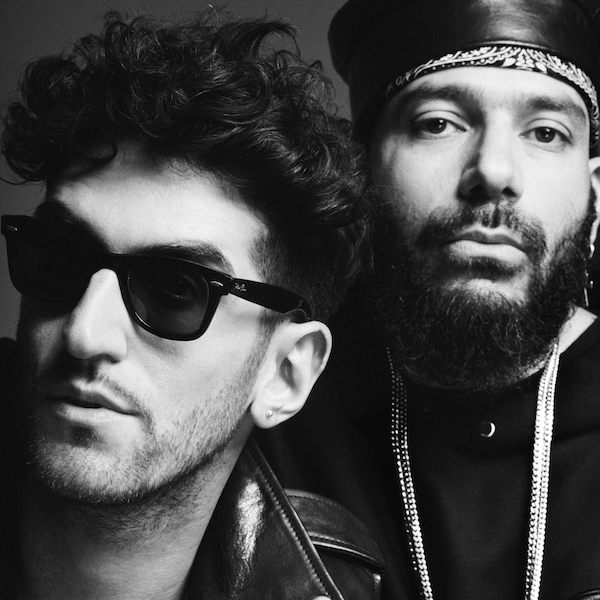
Editor's Note: This story first appeared in its original format in the new issue of Variance. Click here for the full version.
--
Photo by Timothy Saccenti
It’s been more than a decade since Chromeo first began sharing their electrofunk sounds with the world. But the duo is in the middle of a surge unlike anything they’ve experienced before.
As they prepare to release their fourth studio album, White Women, David Macklovitch (aka Dave 1) and Patrick Gemayel (P-Thugg) are suddenly one of the most buzzed-about acts of the year, with appearances slated at many of the major festivals, including Coachella, Bonnaroo and Lollapalooza, as well as the U.K.’s Glastonbury. While the attention is certainly long overdue, it’s actually caught the guys somewhat by surprise.
“It feels kind of affirming to us,” explains Macklovitch, relaxing at an Austin hotel the day after a triumphant performance at SXSW. “In today’s environment, you go away for a couple years and you’re dead to the world. So when we go two years without feedback from the fans, without them knowing what’s going on, that’s really hard.” Adds Gemayel: “We’d have moments of thinking, ‘What are they gonna say?’ Especially when some of the bands that started around the same time as us aren’t around anymore. That can be discouraging.”
Despite having laid low for a couple years, just like old friends, the pair seems to have reconnected with fans right where they left off. And while they acknowledge they didn’t change their sound too dramatically, there’s an undeniable new energy about them.
“We really feel rejuvenated,” says Macklovitch. “As hard as it was to spend that time away from fans, we had to take a full two years to work on the album, not really to reinvent our sound but to kind of polish it up. We needed to revamp it, or reupholster it,” he says as Gemayel laughs. “We reupholstered the couch, guys. Made it like new. It’s even got plastic on it.”
While the duo may jive about their latest evolution, the inspiration for the new material was actually rather meticulous. Motivated by photographer Helmut Newton’s first book title, White Women, the band set out to create a conversation that would extend beyond just ‘70s erotica imagery.
“When we learned about that Newton title, we thought, ‘That would sound so cool as a Roxy Music album title or a [David] Bowie title,’” recalls Macklovitch. “But then we realized, that’s a Chromeo album title. And of course we knew we’d have some explaining to do, but it prompts a lot of questions. Outside of the visuals, which are huge for us, we wanted to talk about gender politics [and] racial politics if need be. We’re an opinionated band so we’re used to that. If you look at the artwork, it’s Pee and I so that it looks like we’re marrying the same girl. And she’s not white but she’s wearing white. So it was kind of a way to open up a conversation.”
Macklovitch and Gemayel also intentionally spent more time on the new album than previous ones, listening to a lot of ‘70s disco and Electric Light Orchestra, drawing once again from different eras. But this time, they “came at it with a little chip on our shoulder,” according to Macklovitch.
It wasn’t so much a grudge as it was a determination to be better and to grow. And even though the album has yet to hit fans’ ears in full, the growth is evident. Not just in their sound but in their fan base.
“Daft Punk’s success this past year definitely helped open that door to the mainstream,” admits Macklovitch. And while their pair’s new music is undoubtedly reaching a much wider audience than their past projects, in more than 10 years, they have yet to see one of their singles chart. “Radio’s a fucking mystery,” laments Macklovitch. “We don’t know how radio works. We can’t influence that, or at least that’s how we’ve looked at it so far. It’s always felt out of reach.”
That’s about to change though, as their addictive singles such as “Jealous (I Ain’t With It)” have already begun collecting radio spins, likely fueled by the track’s virality online. And although the duo takes responsibility for modifying their own sound, they believe asking for outside input played an equally important role in the breadth of their recent success.
{youtube}RhmUnk454MA|600|338|{/youtube}
“We’ve been taking more suggestions than we have in the past,” reveals Gemayel. “We started asking for help and for feedback from a lot of people. And that was a change for us because we’ve always been very protective of what we do.”
To their surprise, they started receiving “really dope suggestions,” as Macklovitch explains. “You can only create music in a vacuum for so long. You can only go so far working in isolation. We’re learning the importance of that feedback. It makes the whole experience better. And it makes us better.”
Among the third-party contributions to the new LP are a handful of collaborations, which Gemayel describes as “very organic,” explaining that “Solange worked on the last record, and we love working with her. Ezra [Koenig of Vampire Weekend] is a good friend of ours, and we had been wanting to do something. And Toro y Moi [aka Chaz Bundick], we had reached out to him and we knew he was a fan. We have mutual respect for each other’s music.”
For “Jealous,” the duo once again sought outside influence. “Pee already had the melody for the verse and I already had one for the chorus. And we worked on the bridge together. But we took it to Oliver [DJ-producer duo on Fool’s Gold Records], and we worked on a few of the songs with them. They made changes we never would have considered and it was amazing.”
The biggest challenge of all came when it was time to decide which tracks would actually appear on the album.
“There’s a lot of stuff we liked but discarded because it didn’t fit in this body of work,” says Macklovitch, explaining that it was important to them to release a true record. “We’re album guys. To us, every album tells a story. If anything, Kendrick and Beyonce and Drake are proof that the album is still alive. And Kanye.”
While the focus was certainly on making a consistent body of work, Chromeo has also thoroughly and openly embraced the bite-sized culture we live in today. And that has worked tremendously in their favor.
“I read everything people are saying,” Macklovitch confesses. “So we do stuff knowing and anticipating what people want to post. We do it for blogs to share and tweet. We think in those terms. ‘Is this going to work online?’ The day our new shit comes out, I’m on Twitter reading everything. I spend my whole night reading it all. I analyze it, even when people dis us. I take that feedback because it’s not us versus the journalists, we’re all together.”
As Chromeo continues in this great but unfamiliar chapter, it’s likely new accolades and benchmarks are in their future. But for two guys who vividly recall being written off by the music industry as “just a novelty act” or “ridiculous caricatures,” their loyalty remains with the people who gave them a chance: the blog culture and indie music fans.
“If we make Billboard, it’ll be a great day,” says Macklovitch. “But we know where we came from. When Fancy Footwork was coming out around 2006-2007, we were championed by blogs. They gave us a shot when the other guys said it wouldn’t work. And we’re forever grateful for that culture. We’ll forever be a blog band.”
--
White Women arrives May 12 on Big Beat/Atlantic.


